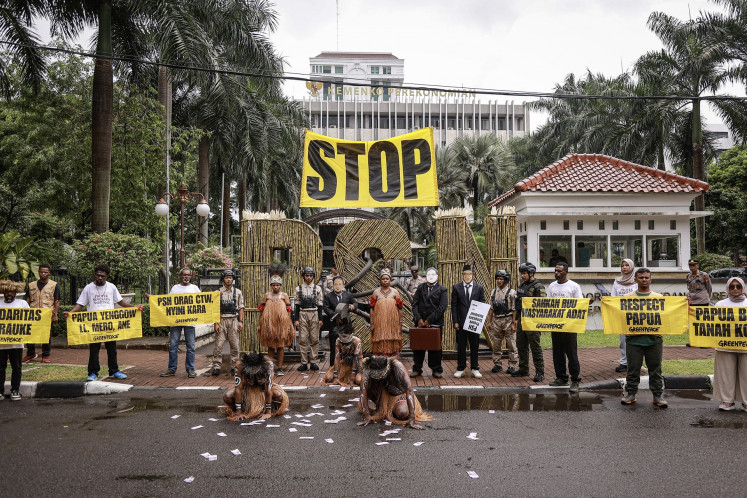Popular Reads
Top Results
Can't find what you're looking for?
View all search resultsPopular Reads
Top Results
Can't find what you're looking for?
View all search resultsPress freedom: Truth is the first casualty of pandemic
Antonio Guterres, the United Nations secretary-general, said press freedom was critical to countering the COVID-19 “pandemic of misinformation”.
Change text size
Gift Premium Articles
to Anyone
W
hen you are officially acknowledged by President Joko “Jokowi” Widodo in an announcement from the State Palace, normally you would feel honored right?
That was not the case for Sita Tyasutami and Maria Darmaningsih, who were identified by the President on March 2 as coronavirus patients number 01 and 02 in Indonesia.
At the time, they were in a hospital, with symptoms now known to be linked to COVID-19, but the two women had not yet been properly diagnosed.
However, the profiles of patients number 01 and 02 — a 31-year-old woman and her 64-year-old mother — their symptoms, their contact history, that they lived in Depok near Jakarta, and that they were treated in an infectious diseases hospital, matched perfectly with what was announced, so they realized it was indeed them.
Imagine their shock! First, to find out that they had COVID-19, and then to receive the news from President Jokowi himself via TV!
Sita and Maria are respectively the daughter and mother who came out in public after their recovery. Earlier as patients they were later joined by Ratri Anindyajati, 33, Sita’s older sister, who later was named patient 03. She was actually only visiting as she normally lives in Vienna. It’s unclear if Ratri got infected via her mother or sister, or whether it was before she even arrived in Indonesia.
This unexpected turn of events and the way that the media, especially social media, handled their story put the lives of these three women into a tailspin. Somehow their names leaked out and they experienced a torrent of abuse by people who accused them of having brought COVID-19 to Indonesia.
It got worse. They were accused of getting infected because they were dancers, which in the past was associated with being prostitutes. Goodness me! Maria and Ratri are both classic traditional Javanese dancers, Sita is a professional dancer and arts manager. Ratri is also a producer and arts manager. They aren’t exactly go-go bar dancers!
The three women were besieged by insults, threats and bullied online. Somehow people found out where they lived and the police had to put yellow tape around their house to protect them.
Maria, Sita and Ratri have now thankfully fully recovered from the coronavirus, and are also slowly recovering from the trauma of the abuse they received and the social stigma they suffered. They blame in particular social media for what happened, for distorting facts, spreading fake news, sensationalizing and for privacy invasion.
The media serves an important role in society, but in a time of coronavirus, it is even more crucial. Antonio Guterres, the United Nations secretary-general, said press freedom was critical to countering the COVID-19 “pandemic of misinformation”.
He cited the proliferation of hate speech (like what Maria, Sita and Ratri experienced), harmful health advice (like United States President Donald Trump suggesting the use of ultraviolet light and the injection of disinfectant as a cure for COVID-19), wild conspiracy theories (about the origins and scale of the virus) and blatant lies (e.g. that the coronavirus pandemic is a hoax), which are harmful to media consumers.
Guterres said, “The antidote to this pandemic of misinformation is fact-based news and analysis. It depends on media freedom and independent reporting”.
Easier said than done, Senhor Guterres, especially when journalists are losing their jobs.
According to the Legal Aid Institute for the Press (LBH Pers) and the Alliance of Independent Journalists (AJI), they “received 61 reports from journalists from 14 media organizations in Greater Jakarta whose employment rights had allegedly been violated,” The Jakarta Post reported on May 5.
According to Stefan Hall and Cathy Li of the World Economic Forum, “The COVID-19 pandemic is disrupting every industry. For the media sector, the coronavirus creates both opportunities and challenges”.
Since people want to know more about the pandemic, especially as they are stuck at home, they are scrambling to get timely and trusted information. But how can journalists do their work if movement is restricted? Some journalists are calling for an end to the lockdown, understandably, because journalists — like medical workers — have to be in the field.
Furthermore, media companies’ revenues have dropped because they have lost many sources of income. Live sports or concerts for example, have been postponed or totally cancelled, which means no advertisements.
May 3 marked World Press Freedom Day, but this doesn’t mean unbridled freedom. In Soeharto’s New Order days (1966-1998), the government often touted the expression bebas bertanggung jawab (free but responsible), which was a euphemism for state censorship.
However, we can still use the term in the present day context with its proper meaning because, as Guterres said, “Accurate information is a life or death issue”.
The impact of the media on the lives of Sita, Maria and Ratri was dramatic and extreme, but for all of us, the mass media is a powerful force on how we experience the world and ourselves.
Currently the three women are sharing their struggle of recovering from COVID-19 to empower people. They even donated their blood plasma to researchers to assist in research for a possible treatment for the virus. They found a silver lining of their ordeal.
“When our diagnosis was confirmed, at least it helped the government to take action,” Ratri said. And now that they have become “celebrities”, they can use the media for the good of everyone — even those who made their lives hell!










